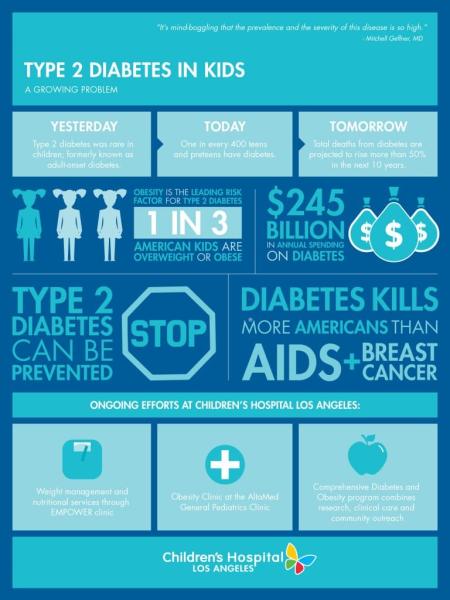
Life Tips to Help Prevent Type 2 Diabetes

Infographic and Q&A with Jamie Wood, MD, director of Clinical Diabetes Programs at Children’s Hospital Los Angeles, to answers the most common questions on diabetes prevention.
What can people do more of in their daily lives to prevent diabetes?
Jamie Wood, MD: There are two types of diabetes so I will offer tips for both.
- Type 1 Diabetes - Individuals with type 1 diabetes were born with a genetic susceptibility to developing type 1 diabetes and we still do not understand how an individual’s environment triggers some people to develop diabetes and some not. Type 1 diabetes is an autoimmune disease where the body attacks and destroys the cells in the pancreas that produce insulin. Although it is actively being researched, type 1 diabetes cannot yet be prevented. Your child could be healthy and active and still develop type 1 diabetes, so it is important for families to know that they did not do anything to have caused the type 1 diabetes. We offer a screening, called TrialNet, for kids if they have a first-degree family member with type 1 diabetes.
- Type 2 Diabetes - This type of diabetes is often associated with being overweight or obese and sedentary, and can be prevented by making healthy lifestyle choices for your child. I highly recommend at least one hour of physical activity or exercise per day and a well-balanced diet for your child (and yourself!). The National Institutes of Health (NIH) offer a great variety of resources for healthy living and recipes. I found ChooseMyPlate.gov helpful in sharing information about portion control and important food groups.
Have you seen an increase or decrease in kids diagnosed with diabetes recently?
JW: We have seen an increase in diagnosis of both types of diabetes in children. Type 2 diabetes used to be an adult health issue, but now we see many kids developing type 2 diabetes because of kids’ decreased exercise and poor eating habits, which are both contributors to the obesity epidemic. The Diabetes Team at Children’s Hospital Los Angeles has a long history of developing programs to combat the obesity epidemic.
What is “diabetes preparedness” and why is it important?
JW: There are two types of diabetes preparedness.
- Daily Preparedness - Make sure you are always prepared when you’re away from home, even if it’s for 15 minutes. You cannot predict when you child’s blood glucose will drop so it is important to always have a source of rapid-acting sugar with you (juice, glucose tablets). You never know when your return to home will be delayed, so children should always have a glucose meter, test strips and insulin with them as well.
- Disaster Preparedness - An individual with a chronic illness such as diabetes needs to take additional steps to prepare for a natural disaster, such as a flood, earthquake, etc. These steps include having extra diabetes supplies stored in the disaster kit (test strips, insulin, and carbohydrate source), three day supply of food and water, copy of current prescriptions).
What’s the most common question you get from parents, about their child’s type 1 diabetes diagnosis?
JW: There are two questions I hear often:
- “Is this going to be for the rest of their life?” The answer is yes, until research gets to the point where we find a cure.
- “Can they have a long and healthy life?” The answer is yes, with hard work, support at home and from the “Diabetes Team” at Children’s Hospital Los Angeles. Through hard work and support, diabetes complications are preventable. With type 1 diabetes, there is no reason why your child cannot live a long and healthy life. For example, here are a few celebrities with type 1 diabetes and they are living good lives: Nick Jonas of The Jonas Brothers; NFL player, Orlando Brown; NHL player, Bobby Clark; MBL player, Ty Cobb and Olympic gold medalist, Gary Hall.


